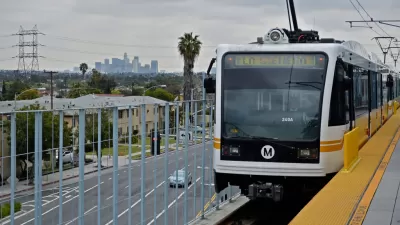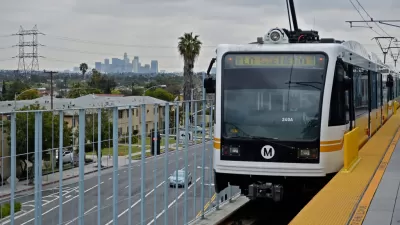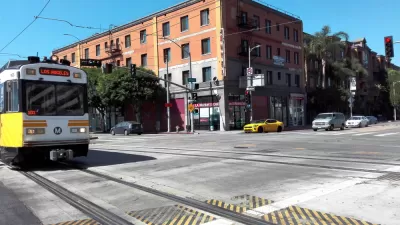A new study finds that within six months of opening, L.A.'s newest light rail line dramatically altered the travel behavior of those living within a half-mile of a station. Among those residents, rail ridership tripled and driving declined 40%.

The findings of "the first experimental study of the effects of a new rail line in Los Angeles" makes a persuasive case for the positive impacts of new rail options on Angelenos' travel habits.
"In fall 2011, researchers asked more than 200 households in the Exposition Corridor, the Crenshaw Corridor and Harvard Park to track their travel habits and odometer readings for seven days. The same households repeated the exercise in 2012, when the Expo Line had been open for about six months," explains Laura J. Nelson. "Households within a half-mile of an Expo Line station reduced their driving by 10 to 12 miles a day, compared with those who lived farther away, according to the data."
Other positive outcomes generated by the new line include a 30% reduction carbon emissions and an increase in exercise among residents.
FULL STORY: Residents living near Expo Line stations reduce car use, study shows

Planetizen Federal Action Tracker
A weekly monitor of how Trump’s orders and actions are impacting planners and planning in America.

Maui's Vacation Rental Debate Turns Ugly
Verbal attacks, misinformation campaigns and fistfights plague a high-stakes debate to convert thousands of vacation rentals into long-term housing.

Restaurant Patios Were a Pandemic Win — Why Were They so Hard to Keep?
Social distancing requirements and changes in travel patterns prompted cities to pilot new uses for street and sidewalk space. Then it got complicated.

In California Battle of Housing vs. Environment, Housing Just Won
A new state law significantly limits the power of CEQA, an environmental review law that served as a powerful tool for blocking new development.

Boulder Eliminates Parking Minimums Citywide
Officials estimate the cost of building a single underground parking space at up to $100,000.

Orange County, Florida Adopts Largest US “Sprawl Repair” Code
The ‘Orange Code’ seeks to rectify decades of sprawl-inducing, car-oriented development.
Urban Design for Planners 1: Software Tools
This six-course series explores essential urban design concepts using open source software and equips planners with the tools they need to participate fully in the urban design process.
Planning for Universal Design
Learn the tools for implementing Universal Design in planning regulations.
Heyer Gruel & Associates PA
JM Goldson LLC
Custer County Colorado
City of Camden Redevelopment Agency
City of Astoria
Transportation Research & Education Center (TREC) at Portland State University
Jefferson Parish Government
Camden Redevelopment Agency
City of Claremont




























